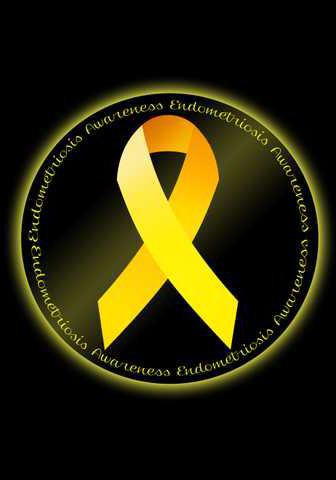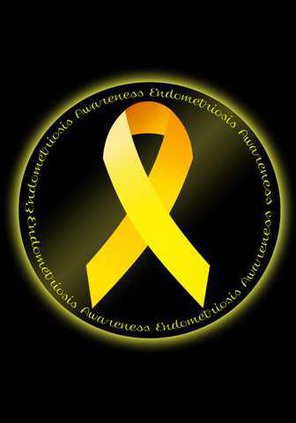Mother Nature definitely has something against women, otherwise we wouldn't have to deal with seven or more days of bloating, pain, bleeding and fatigue every month. But, unfortunately, that is the price every woman pays for having been born with a uterus.
Now days, having extremely painful cramps during your period is deemed "normal," when most likely, that isn't the case at all. If you (like myself), find yourself taking sick days from work or curled in the fetal position during that special time of the month, you may have something more sinister going on than just normal cramps.
Endometriosis is a painful disorder where the tissue that lines your uterus gets wanderlust and starts to grow outside of the uterus the pain it causes is comparable to an all out war taking place in your abdomen. Lovely.
According to the Endometriosis Foundation of America, the disorder affects over 176 million women between the ages of 12-60 worldwide. And what's worse, is that many women live with the symptoms of endometriosis for years because of misdiagnosis, or because they think their symptoms aren't a concern.
Well, I am here to shed some light on the subject. Here are seven signs you may have endometriosis:
1. Severe menstrual cramps
Sure, some women can have some minor cramping during their period and not have endometriosis, but if you experience devastatingly painful cramps that interfere with your day-to-day life each month, you may want to visit your gynocologist. Pelvic pain that particularly begins a few days before your cycle begins and continues when your period begins is a definite sign of endometriosis. The pain can also radiate through your abdomen, into your lower back and even your groin. Whatever your symptoms may be, if you experience severe pain and cramps that none of your friends seem to complain about, a professional opinion can give you some answers.
2. Gastrointestinal issues
As embarrassing as it may be, endometriosis can be the cause of the gastrointestinal problems you live with every day, particularly constipation and diarrhea. In fact, endometriosis is often confused with irritable bowel syndrome (IBS) or food allergies because of the similar symptoms they can cause.
3. Women in your family have it
If your sister, aunt or mother has endometriosis, your risk of developing it is doubled. Ask your relatives about their symptoms and experience with endometriosis and compare them to yours. They may be able to give you some answers, but your gynocologist will be the one who ultimately determines the diagnosis.
4. Your periods are heavy
Experiencing clotting, heavy bleeding or a period that lasts longer than seven days are all indicators of endometriosis. Pay attention to any changes regarding the duration of your period or how heavy your flow is. Endometriosis can form just a few years after your first menstrual cycle, so normal for you may not be normal at all.
5. An unpredictable cycle
When "Aunt Flow" comes knocking much too soon or doesn't seem to come on time, things may not be operating as they should be. If your cycle is less than 28 days long or comes a week or so late every month, endometriosis could be the culprit. Make a note of any changes in your cycle or any abnormalities you may experience.
6. Painful sex
Endometriosis can cause pain during intercourse, soon after or it can sometimes continue for a few days after. Although there are other causes for pain during sex, any discomfort you have should be discussed with your doctor.
7. Difficulty conceiving
Many women do not get diagnosed with endometriosis until they visit a doctor regarding infertility. According to Mayo Clinic, one-third to one-half of women who suffer from endometriosis struggle to get pregnant.
Whatever your symptoms may be, if something is not right or you aren't able to live productively and well because of your period every month, treat yourself a visit to your gynocologist. Endometriosis is a chronic disorder, but it can be treated. It's not worth it to live with pain and discomfort all while trying to be the amazing woman you are, so take a moment and get your body the answers and help it needs to keep you in top form.
Now days, having extremely painful cramps during your period is deemed "normal," when most likely, that isn't the case at all. If you (like myself), find yourself taking sick days from work or curled in the fetal position during that special time of the month, you may have something more sinister going on than just normal cramps.
Endometriosis is a painful disorder where the tissue that lines your uterus gets wanderlust and starts to grow outside of the uterus the pain it causes is comparable to an all out war taking place in your abdomen. Lovely.
According to the Endometriosis Foundation of America, the disorder affects over 176 million women between the ages of 12-60 worldwide. And what's worse, is that many women live with the symptoms of endometriosis for years because of misdiagnosis, or because they think their symptoms aren't a concern.
Well, I am here to shed some light on the subject. Here are seven signs you may have endometriosis:
1. Severe menstrual cramps
Sure, some women can have some minor cramping during their period and not have endometriosis, but if you experience devastatingly painful cramps that interfere with your day-to-day life each month, you may want to visit your gynocologist. Pelvic pain that particularly begins a few days before your cycle begins and continues when your period begins is a definite sign of endometriosis. The pain can also radiate through your abdomen, into your lower back and even your groin. Whatever your symptoms may be, if you experience severe pain and cramps that none of your friends seem to complain about, a professional opinion can give you some answers.
2. Gastrointestinal issues
As embarrassing as it may be, endometriosis can be the cause of the gastrointestinal problems you live with every day, particularly constipation and diarrhea. In fact, endometriosis is often confused with irritable bowel syndrome (IBS) or food allergies because of the similar symptoms they can cause.
3. Women in your family have it
If your sister, aunt or mother has endometriosis, your risk of developing it is doubled. Ask your relatives about their symptoms and experience with endometriosis and compare them to yours. They may be able to give you some answers, but your gynocologist will be the one who ultimately determines the diagnosis.
4. Your periods are heavy
Experiencing clotting, heavy bleeding or a period that lasts longer than seven days are all indicators of endometriosis. Pay attention to any changes regarding the duration of your period or how heavy your flow is. Endometriosis can form just a few years after your first menstrual cycle, so normal for you may not be normal at all.
5. An unpredictable cycle
When "Aunt Flow" comes knocking much too soon or doesn't seem to come on time, things may not be operating as they should be. If your cycle is less than 28 days long or comes a week or so late every month, endometriosis could be the culprit. Make a note of any changes in your cycle or any abnormalities you may experience.
6. Painful sex
Endometriosis can cause pain during intercourse, soon after or it can sometimes continue for a few days after. Although there are other causes for pain during sex, any discomfort you have should be discussed with your doctor.
7. Difficulty conceiving
Many women do not get diagnosed with endometriosis until they visit a doctor regarding infertility. According to Mayo Clinic, one-third to one-half of women who suffer from endometriosis struggle to get pregnant.
Whatever your symptoms may be, if something is not right or you aren't able to live productively and well because of your period every month, treat yourself a visit to your gynocologist. Endometriosis is a chronic disorder, but it can be treated. It's not worth it to live with pain and discomfort all while trying to be the amazing woman you are, so take a moment and get your body the answers and help it needs to keep you in top form.

